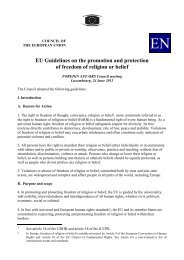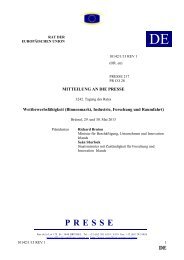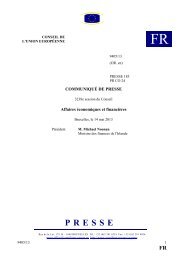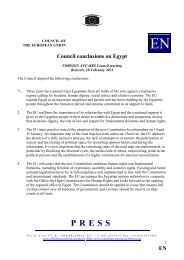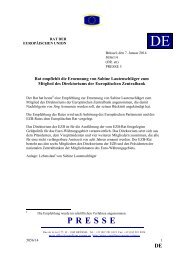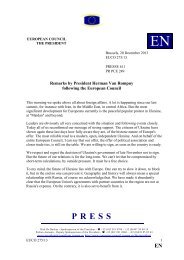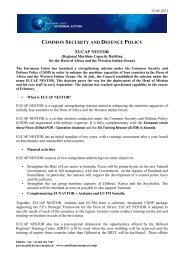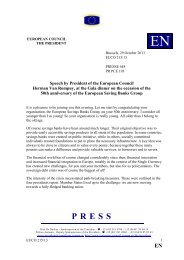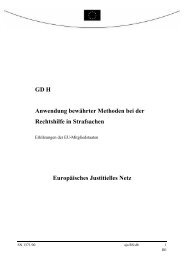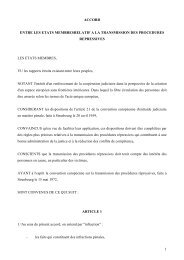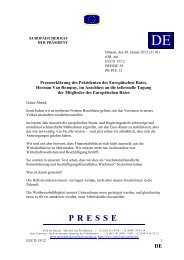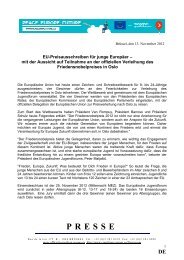14508/09 ADD 1 PL/vk 1 DG G COUNCIL OF THE ... - Europa
14508/09 ADD 1 PL/vk 1 DG G COUNCIL OF THE ... - Europa
14508/09 ADD 1 PL/vk 1 DG G COUNCIL OF THE ... - Europa
You also want an ePaper? Increase the reach of your titles
YUMPU automatically turns print PDFs into web optimized ePapers that Google loves.
The Belgian quota law adopted in 2002 provides that female candidates shall occupy half of the<br />
positions on the list, including at least one out of the two top positions. Party lists which do not<br />
abide by this law are declared invalid. Belgium reports that the introduction of this law has resulted<br />
in an increase in the proportion of women in national parliament from 20 % to 35 %. In France, the<br />
2000 election law provides that the parity reform (50-50 %) shall apply to all elections by<br />
proportional ballot, and be applied to the overall balance among male and female candidates for<br />
each party in national elections, which are determined by a two-round majority vote. France reports<br />
that the adoption of legal measures has resulted in an increase from 27.5 % women in regional/local<br />
assemblies in 1998 to 47.6 % in 2004. A similar result may be noted in French elections to the<br />
European Parliament, in which the proportion of women elected increased to 43.6 % in 2004. The<br />
proportion of women in the national parliament, however, is only 19 %.<br />
Legal quotas to combat women's under-representation in elected bodies have also been introduced<br />
in Spain. According to the Spanish Equality Law of 2007, party electoral lists are required to have a<br />
minimum of 40 % and a maximum of 60 % of either sex among their candidates in all elections.<br />
Although parity has not been fully implemented in elected bodies, Spain reports on an increased<br />
level of female representation: from 28 % to 36 % in the Congress, and from 24 % to 28 % in the<br />
Senate. In Portugal, moreover, the Organic Law 3/2006 stipulates a minimum representation (33 %)<br />
of women and men in the lists of candidates for election. Additionally, for local, Portuguese and<br />
European Parliament elections the candidate lists must not have more than two persons of the same<br />
sex in succession. The law will be fully applied for the first time to the local, national and European<br />
elections to be held in 20<strong>09</strong>.<br />
Slovenia too has enacted electoral gender quotas, first for local elections in 2005 and then for the<br />
national assembly elections in 2006. According to the Local Elections Law of 2005, candidate lists<br />
for the municipal elections must ensure that either sex accounts for at lest 40 % of all candidates,<br />
and that the candidates in the first half of the list alternate by sex. According to the National<br />
Assembly Elections Act of 2006, either sex must be represented by at least 35 % of the total number<br />
of candidates on the list, provided that the list contains at least four candidates. The introduction of<br />
quotas fell short with the 2008 elections, in which only 13 % women were elected to the national<br />
parliament.<br />
<strong>14508</strong>/<strong>09</strong> <strong>ADD</strong> 1 <strong>PL</strong>/<strong>vk</strong> 107<br />
ANNEX <strong>DG</strong> G EN



